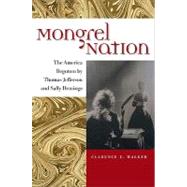Mongrel Nation
, by Walker, Clarence Earl- ISBN: 9780813927787 | 0813927781
- Cover: Paperback
- Copyright: 1/30/2010
The debate over the affair between Thomas Jefferson and SallyHemings rarely rises above the question of "Did they or didn'tthey?" But lost in the argument over the existence of such a relationshipare equally urgent questions about a history that is more complex, both sexually andculturally, than most of us realize. Mongrel Nation seeks to uncover thiscomplexity, as well as the reasons it is so often obscured.Clarence Walker contends that the relationshipbetween Jefferson and Hemings must be seen not in isolation but in the broadercontext of interracial affairs within the plantation complex. Viewed from thisperspective, the relationship was not unusual or aberrant but was fairly typical.For many, this is a disturbing realization, because it forces us to abandon the ideaof American exceptionalism and re-examine slavery in America as part of a long,global history of slaveholders frequently crossing the colorline.More than many other societies--and despiteour obvious mixed-race population--our nation has displayed particular reluctance toacknowledge this dynamic. In a country where, as early as 1662, interracial sex wasalready punishable by law, an understanding of the Hemings-Jefferson relationshiphas consistently met with resistance. From Jefferson's time to our own, the generalpublic denied--or remained oblivious to--the possibility of the affair. Historians,too, dismissed the idea, even when confronted with compelling arguments by fellowscholars. It took the DNA findings of 1998 to persuade many (although, to this day,doubters remain).The refusal to admit thelikelihood of this union between master and slave stems, of course, from Jefferson'ssymbolic significance as a Founding Father. The president's apologists, both beforeand after the DNA findings, have constructed an iconic Jefferson that tells us moreabout their own beliefs--and the often alarming demands of those beliefs--than itdoes about the interaction between slave owners and slaves. Much more than a searchfor the facts about two individuals, the debate over Jefferson and Hemings isemblematic of tensions in our society between competing conceptions of race and ofour nation.







